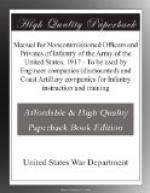Aromatic spirits of ammonia may be poured on a handkerchief and held continuously within 3 inches of the face and nose. If other ammonia preparations are used, they should be diluted or held farther away. Try it on your own nose first.
When the operator is a heavy man it is necessary to caution him not to bring force too violently upon the ribs, as one of them might be broken.
Do not attempt to give liquids of any kind to the patient while unconscious. Apply warm blankets and hot-water bottles as soon as they can be obtained.
CHAPTER XIV.
LAWS AND REGULATIONS.
SECTION 1. GENERAL PROVISIONS.
The Army of the United States is governed by certain laws called “The Articles of War” and certain regulations called “Army Regulations.”
The following list includes the offenses most often committed by soldiers, generally through ignorance or carelessness rather than viciousness. Violations of any rule or regulation should be carefully guarded against, since they not only subject the offender to punishment, but also bring discredit on his comrades, his organization, and on the military profession:
1. Selling, pawning, or, through neglect, losing or spoiling any Government property, such as uniforms, blankets, equipment, ammunition, etc.
2. Disobedience of the orders of any officer or noncommissioned officer.
3. Disrespect to an officer or noncommissioned officer.
4. Absence from camp without leave.
5. Absence from any drill, formation, or other duty without authority.
6. Drunkenness on duty or off duty, whether in camp or when absent either with or without leave.
7. Bringing liquor into camp.
8. Noisy or disorderly conduct in camp or when absent either with or without leave.
9. Entering on private property, generally for the purpose of stealing fruit, etc.
10. Negligence or carelessness at drill or on other duty, particularly while on guard or as a sentinel over prisoners.
11. Wearing an unauthorized uniform or wearing the uniform in an improper manner.
12. Urinating in or around camp.
13. Falling to salute properly.
14. Disrespect or affront to a sentinel.
15. Abuse or neglect of his horse.
“The basic principles of the combat tactics of the different arms are set forth in the Drill Regulations of those arms for units as high as brigades,” (Preface,Field_Service_Regulations_.)
“The Drill Regulations are furnished as a guide. They provide the principles for training and for increasing the probability of success in battle. In the interpretation of the regulations the spirit must be sought. Quibbling over the minutae of form is indicative of failure to grasp the spirit,” (Paragraph4,_ InfantryDrill_Regulations._)




